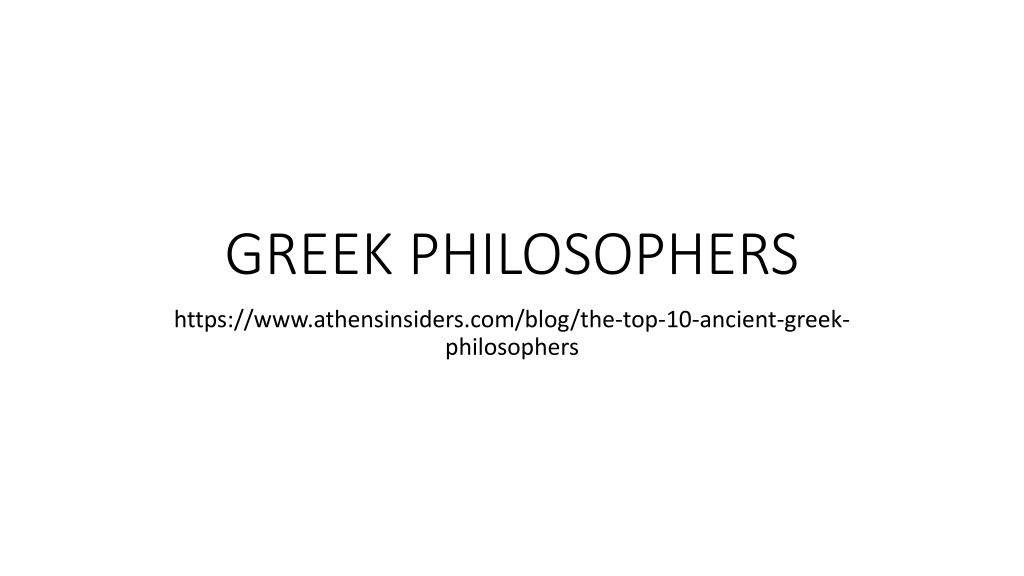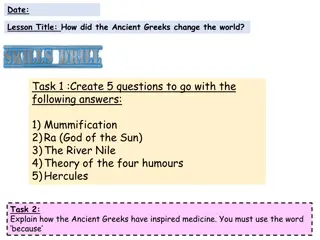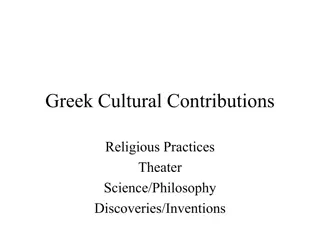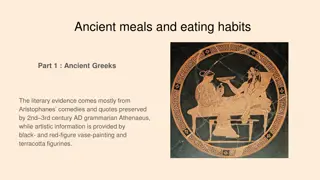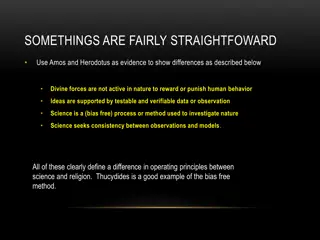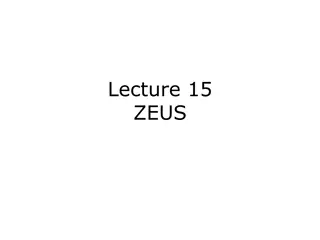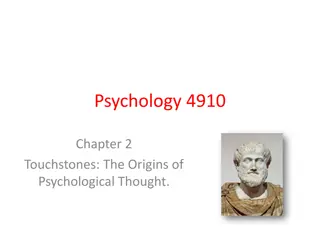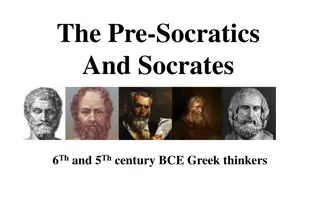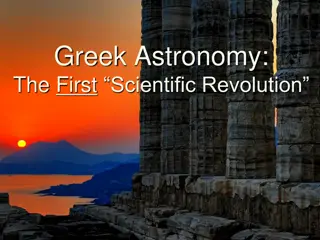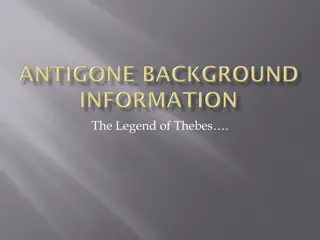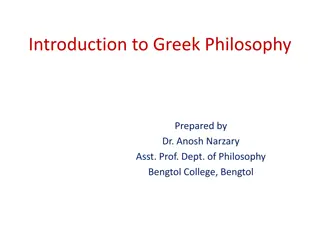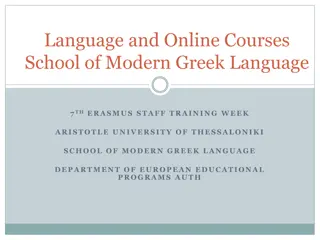Ancient Greek Philosophers and Their Revolutionary Ideas
Explore the influential ancient Greek philosophers like Anaxagoras and Pythagoras, who delved into topics like the interconnectedness of all things and the fundamental essence of the universe. These thinkers laid the groundwork for modern philosophy and mathematics with their unique perspectives and innovative ideas.
Download Presentation

Please find below an Image/Link to download the presentation.
The content on the website is provided AS IS for your information and personal use only. It may not be sold, licensed, or shared on other websites without obtaining consent from the author. Download presentation by click this link. If you encounter any issues during the download, it is possible that the publisher has removed the file from their server.
E N D
Presentation Transcript
GREEK PHILOSOPHERS https://www.athensinsiders.com/blog/the-top-10-ancient-greek- philosophers
The seed of everything is in everything else. The seed of everything is in everything else.
The seed of everything is in everything else. The seed of everything is in everything else. Anaxagoras (500-428) was a pre-Socratic Greek philosopher who lived in Athens. He believed that in the physical world, everything contains a portion of everything else. Nothing was pure on its own and nous (which means mind ) asserts a certain motion and meaning to the entities in this chaos. His ideas contrasted and collided with the contemporary ideologies and beliefs that led him to face life- threatening consequences and exile.
There is geometry in the humming of the strings, There is geometry in the humming of the strings, there is music in the spacing of the spheres. there is music in the spacing of the spheres.
There is geometry in the humming of the strings, There is geometry in the humming of the strings, there is music in the spacing of the spheres. there is music in the spacing of the spheres. Pythagoras (570-495) is a famous mathematician who is credited with inventing the Pythagorean Theorem, one of the key computations in geometry. Although better known for his legendary contribution to mathematics, his philosophical works and ideas have had a great influence on modern philosophy and on Plato as well. He regarded the world as perfect harmony and aimed his teaching on how to lead a harmonious life. Some legends also indicate that he was the first to teach that the Earth was round.
There is nothing permanent except change. There is nothing permanent except change.
There is nothing permanent except change. There is nothing permanent except change. Heraclitus (535-475) thought that change is the fundamental essence of the universe, as stated in the famous saying, "No man ever steps in the same river twice". He also said that opposites attract and that fire was the base for all things in the world. He was also called "The Obscure" and the "Weeping Philosopher", because of the lonely life he led and the nature of his philosophy.
Nothing exists except atoms and empty space; Nothing exists except atoms and empty space; everything else is opinion. everything else is opinion.
Nothing exists except atoms and empty space; Nothing exists except atoms and empty space; everything else is opinion. everything else is opinion. Democritus (460-370), the laughing philosopher , was one of the first advocates of democracy, equality and liberty. He was also the first person, along with his mentor Leucippus, to advance the hypothesis that all matter is composed of small invisible particles called atoms. Many consider Democritus to be the "father of modern science". Apart from that, Democritus was a proponent of the just theory the idea that people should take up arms to defend themselves from tyrants.
There are forces in nature called Love and Hate. The force of There are forces in nature called Love and Hate. The force of Love causes elements to be attracted to each other and to be Love causes elements to be attracted to each other and to be built up into some particular form or person, and the force of built up into some particular form or person, and the force of Hate causes the decomposition of things. Hate causes the decomposition of things.
There are forces in nature called Love and Hate. The force of There are forces in nature called Love and Hate. The force of Love causes elements to be attracted to each other and to be Love causes elements to be attracted to each other and to be built up into some particular form or person, and the force of built up into some particular form or person, and the force of Hate causes the decomposition of things. Hate causes the decomposition of things. Empedocles (490-430) philosophical landmark was originating the cosmogenic theory of the four classical elements. It states that all matter is basically composed of four primary elements earth, air, fire and water. He also put forth the idea of opposite motive forces involved in building of the world namely, love as the cause of union and strife as the cause of separation.
The most difficult thing in life is to know The most difficult thing in life is to know yourself. yourself.
The most difficult thing in life is to know The most difficult thing in life is to know yourself. yourself. Thales of Miletus (624-546) is regarded as one of the fathers of Greek philosophy, being a pivotal point for following generations of famous thinkers, philosophers and scientists. He was the first to try to explain natural phenomena without the inclusion of myths, by theories and hypothesis, ergo science. Aristotle points Thales as the first person to have investigated basic principles such as origination of matter. Thales is also said to be the founder of school of natural philosophy.
We are what we repeatedly do. Excellence, We are what we repeatedly do. Excellence, then, is not an act, but a habit. then, is not an act, but a habit.
We are what we repeatedly do. Excellence, We are what we repeatedly do. Excellence, then, is not an act, but a habit. then, is not an act, but a habit. A student of Plato and the teacher of Alexander the Great, Aristotle (384-322) is considered one of the world s greatest ancient philosophers. Aristotle studied a wide variety of subjects, including science, ethics, government, physics and politics, and wrote extensively on them. He believed that people s concepts and all of their knowledge were ultimately based on perception. All aspects of Aristotle's philosophy continue to be the object of active academic study today.
We can easily forgive a child who is afraid of the We can easily forgive a child who is afraid of the dark; the real tragedy of life is when men are afraid dark; the real tragedy of life is when men are afraid of the light. of the light.
We can easily forgive a child who is afraid of the We can easily forgive a child who is afraid of the dark; the real tragedy of life is when men are afraid dark; the real tragedy of life is when men are afraid of the light. of the light. Plato (428-348), a student of Socrates, is regarded as the father of political science and the founder of one of the world's first known institutions of higher learning, the Academy in Athens. For him, the highest of forms was that of the good , which he took as the cause of being and knowledge. Plato wrote one of the first and most influential works on politics, The Republic, which described an ideal or Utopian society. Like his mentor Socrates, Plato was a critic of democracy.
Strong minds discuss ideas, average minds Strong minds discuss ideas, average minds discuss events, weak minds discuss people. discuss events, weak minds discuss people.
Strong minds discuss ideas, average minds Strong minds discuss ideas, average minds discuss events, weak minds discuss people. discuss events, weak minds discuss people. The most well-known ancient Greek Philosopher of all time, Socrates (469- 399), was a master stonemason and social critic. He never wrote anything and most of his philosophical contributions come through his students, mainly Plato. Socrates became famous for encouraging people to critically question everything. His greatest contribution to philosophy was the Socratic Method in which discussion, argument, and dialogue are used to discern the truth. Eventually, his beliefs and realistic approach in philosophy led to his end, as he was tried and convicted for criticizing religion and corrupting the youth. Socrates then chose death by suicide over exile from his homeland of Athens. His legendary trial and death at the altar of the ancient Greek democratic system has changed the academic view of philosophy as a study of life itself.
